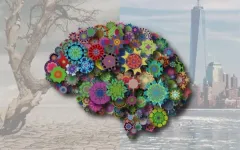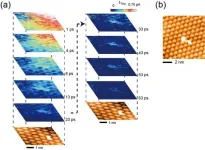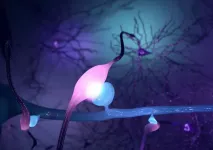Does aspirin lower colorectal cancer risk in older adults? It depends on when they start.
Study finds that daily aspirin use does not reduce risk of colorectal cancer among adults who begin taking it after age 59.
2021-01-21
(Press-News.org) BOSTON - Regular aspirin use has clear benefits in reducing colorectal cancer incidence among middle-aged adults, but also comes with some risk, such as gastrointestinal bleeding. And when should adults start taking regular aspirin and for how long?
There is substantial evidence that a daily aspirin can reduce risk of colorectal cancer in adults up to age 70. But until now there was little evidence about whether older adults should start taking aspirin.
A team of scientists set out to study this question. They were led by Andrew T. Chan MD, MPH, a gastroenterologist and chief of the Clinical and Translational Epidemiology Unit at Massachusetts General Hospital (MGH). Their report appears in JAMA Oncology.
The researchers carried out a pooled analysis of two large U.S. cohort studies: The Nurses' Health Study (January 1980 - June 2014) and the Health Professionals Follow-up Study (January 1986 - January 2014). These two studies contributed data on more than 94,500 participants' use of aspirin over about 35 years, offering a unique opportunity to understand the effect of aspirin use across the lifespan on cancer risk.
The researchers found that regular aspirin use was linked to lower colorectal cancer risk among people aged 70 or older. However, this advantage was only significant among people who started taking aspirin before the age of 70. People who started regular aspirin use at the age of 70 or older did not seem to reap any benefit.
"There is considerable evidence that aspirin can prevent colorectal cancer in adults between 50 and 70 years old," says Chan. "But it has not been clear whether the effect is similar in older adults."
Aspirin is considered the most well-established agent that protects against colorectal cancer (CRC). It is currently recommended by the U.S. Preventive Services Task Force for people aged 50-59 years with specific cardiovascular risk profiles because of its protective effect against heart disease.
However, the recent Aspirin in Reducing Events in the Elderly (ASPREE) trial reported that participants who took a daily low dose of aspirin (100 mg) after age 70 for about five years actually had an unexpected 30% higher risk of death from cancer. The vast majority of the ASPREE participants (89%) had never taken aspirin regularly before joining the study. Chan's team also recently reported that ASPREE participants on aspirin did not experience an increase or decrease in risk of developing a cancer despite having an increase in risk of death from cancer.
That led to the question: Does regular aspirin benefit or harm people older than 70 and does it matter when aspirin was started?
The current study confirms that initiating aspirin at an older age was not associated with a lower risk of colorectal cancer. However, importantly, there is a potential benefit of continuing aspirin if is started at an earlier age. These results, the researchers say, "strongly suggest that there is a potential biological difference in the effect of aspirin at older ages which requires further research."
Adds Chan: "As people get older, if they are not already taking aspirin, a discussion is warranted about whether to start aspirin after weighing the benefits against the risks."
INFORMATION:
About the Massachusetts General Hospital
Massachusetts General Hospital, founded in 1811, is the original and largest teaching hospital of Harvard Medical School. The Mass General Research Institute conducts the largest hospital-based research program in the nation, with annual research operations of more than $1 billion and comprises more than 9,500 researchers working across more than 30 institutes, centers and departments. In August 2020, Mass General was named #6 in the U.S. News & World Report list of "America's Best Hospitals."
ELSE PRESS RELEASES FROM THIS DATE:
2021-01-21
Tsukuba, Japan -- How valuable are earmuffs? The answer to this simple question can depend. What brand are they? Are they good quality? What is the weather like? Given the choice between earmuffs and suntan lotion, most people would choose to have the earmuffs on a cold winter day and the lotion on a sunny day at the beach. This ability to place different values on objects depending on the environmental context is something that we do all the time without much thought or effort. But how does it work? A new study led by Assistant Professor Jun Kunimatsu at the University of Tsukuba in Japan and Distinguished Investigator Okihide Hikosaka at the National Eye Institute (NEI) in the United States has discovered the part of ...
2021-01-21
The elusive axion particle is many times lighter than an electron, with properties that barely make an impression on ordinary matter. As such, the ghost-like particle is a leading contender as a component of dark matter -- a hypothetical, invisible type of matter that is thought to make up 85 percent of the mass in the universe.
Axions have so far evaded detection. Physicists predict that if they do exist, they must be produced within extreme environments, such as the cores of stars at the precipice of a supernova. When these stars spew axions out into the universe, the ...
2021-01-21
Tsukuba, Japan - A team of researchers from the Faculty of Pure and Applied Sciences at the University of Tsukuba filmed the ultrafast motion of electrons with sub-nanoscale spatial resolution. This work provides a powerful tool for studying the operation of semiconductor devices, which can lead to more efficient electronic devices.
The ability to construct ever smaller and faster smartphones and computer chips depends on the ability of semiconductor manufacturers to understand how the electrons that carry information are affected by defects. However, these motions occur on the scale of trillionths of a second, and they can only be seen with a microscope that can image individual atoms. ...
2021-01-21
The results of a study led by Northern Arizona University and the Translational Genomics Research Institute (TGen), an affiliate of City of Hope, suggest the immune systems of people infected with COVID-19 may rely on antibodies created during infections from earlier coronaviruses to help fight the disease.
COVID-19 isn't humanity's first encounter with a coronavirus, so named because of the corona, or crown-like, protein spikes on their surface. Before SARS-CoV-2 -- the virus that causes COVID-19 -- humans have navigated at least 6 other types of coronaviruses.
The study sought to understand how coronaviruses (CoVs) ignite the human immune system and conduct a deeper ...
2021-01-21
An adverse upbringing often impairs people's circumstances and health in their adult years, especially for couples who have both had similar experiences. This is shown by a new study, carried out by Uppsala University researchers, in which 818 mothers and their partners filled in a questionnaire one year after having a child together. The study is now published in the scientific journal PLOS ONE.
"When we studied couples where both partners stated they'd had a hard time as children, the connection between negative childhood experience and a relatively ...
2021-01-21
Early Medieval Europe is frequently viewed as a time of cultural stagnation, often given the misnomer of the 'Dark Ages'. However, analysis has revealed new ideas could spread rapidly as communities were interconnected, creating a surprisingly unified culture in Europe.
Dr Emma Brownlee, Department of Archaeology, University of Cambridge, examined how a key change in Western European burial practices spread across the continent faster than previously believed - between the 6th - 8th centuries AD, burying people with regionally specific grave goods was largely abandoned in favour of a more standardised, unfurnished burial.
"Almost everyone from the eighth century onwards ...
2021-01-21
As scientists increasingly rely on eyewitness accounts of earthquake shaking reported through online systems, they should consider whether those accounts are societally and spatially representative for an event, according to a new paper published in Seismological Research Letters.
Socioeconomic factors can play a significant if complex role in limiting who uses systems such as the U.S. Geological Survey's "Did You Feel It?" (DYFI) to report earthquake shaking. In California, for instance, researchers concluded that DYFI appears to gather data across a wide socioeconomic range, albeit with some intriguing differences related to neighborhood income levels during earthquakes such as the ...
2021-01-21
The neocortex is the part of the brain that humans use to process sensory impressions, store memories, give instructions to the muscles, and plan for the future. These computational processes are possible because each nerve cell is a highly complex miniature computer that communicates with around 10,000 other neurons. This communication happens via special connections called synapses.
The bigger the synapse, the stronger its signal
Researchers in Kevan Martin's laboratory at the Institute of Neuroinformatics at the University of Zurich (UZH) and ETH Zurich have now shown for the first time that the size of synapses determines the strength of their ...
2021-01-21
TAMPA, Fla. -- Myelodysplastic Syndromes (MDS) and acute myeloid leukemia (AML) are rare hematologic malignancies of the bone marrow. They can occur spontaneously or secondary to treatment for other cancers, so called therapy related disease, which is frequently associated with a mutation of the tumor suppressor gene TP53. Standard treatment for these patients includes hypomethylating agents such as azacitidine or decitabine but unfortunately outcomes are very poor.
"Patients with TP53-mutant disease, which is roughly 10% to 20% of AML and de novo MDS cases, don't have many options ...
2021-01-21
Growing perennial grasses on abandoned cropland has the potential to counteract some of the negative impacts of climate change by switching to more biofuels, according to a research group from the Norwegian University of Science and Technology (NTNU).
Researchers consider increased use of biofuels to be an important part of the solution to reduce CO2 emissions. But the production of plants for biofuels can have some unfortunate trade-offs.
Now, the NTNU researchers have come up with a scenario that would put less pressure on food production and plant and animal life.
"We can grow perennial grasses in areas that until recently were used for growing food but that are no longer used for that purpose," explains Jan Sandstad ...
LAST 30 PRESS RELEASES:
[Press-News.org] Does aspirin lower colorectal cancer risk in older adults? It depends on when they start.
Study finds that daily aspirin use does not reduce risk of colorectal cancer among adults who begin taking it after age 59.



